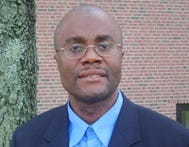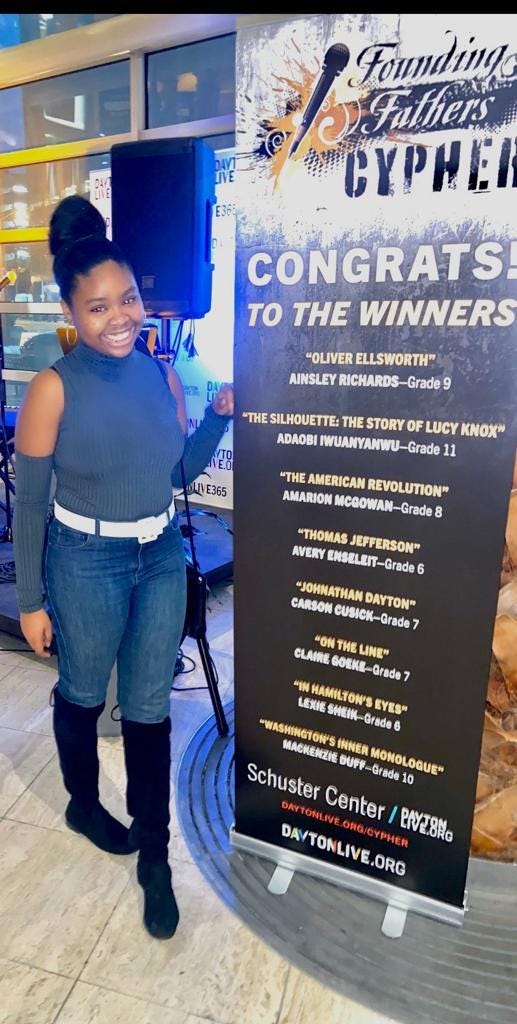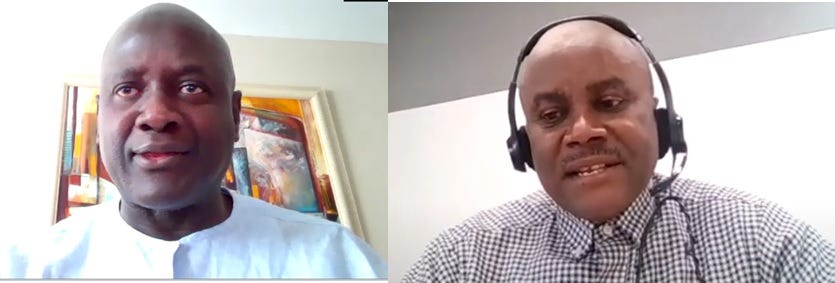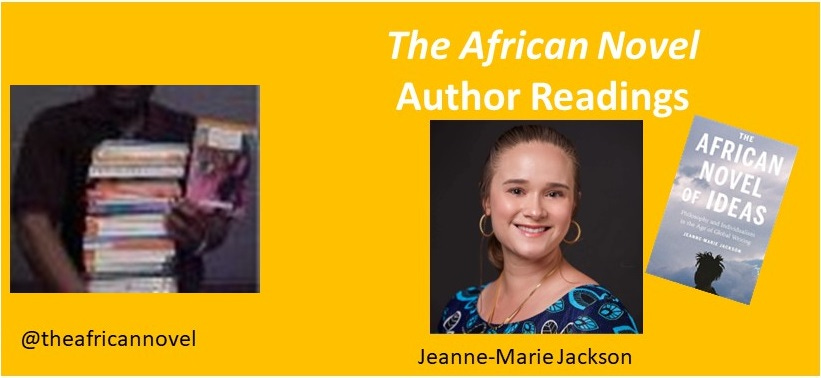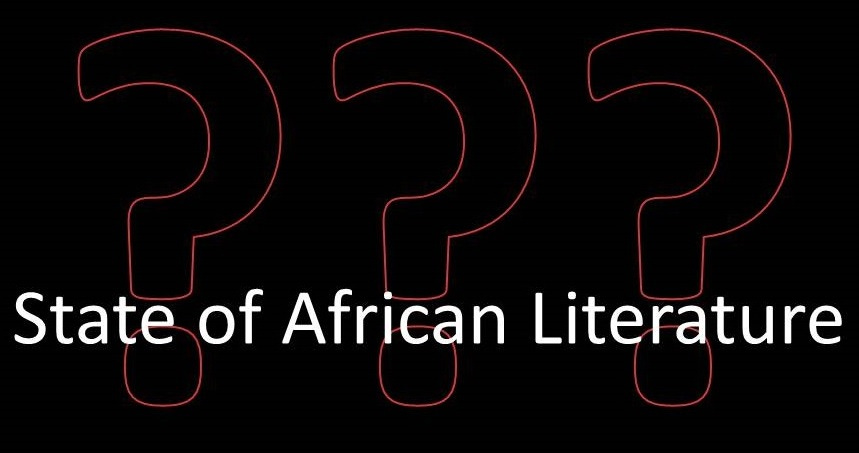Welcome to the latest issue of The African Novel digital newsletter. You have joined an exciting global community of publishers, authors, readers, writers, poets, and performers, as well as academics, missionaries, and even current and former Peace Corps volunteers. We are all connected in our passion for appreciating, celebrating, and sharing African literature and performance in its many forms.
To savor this e-newsletter, we’d highly recommend you patiently read from top to bottom!
Thanks for reading The African Novel! Subscribe for free to receive new posts.
IN THIS ISSUE
Editor-in-Chief's Message
Book Excerpt I: Eyes of the Slain Woman
The African Novel Podcast: Poet Tijan Sallah
Author Readings: Jeanne-Marie Jackson
State of African Literature
Bookshelf
Book Events & More
Our Radio Archives
African Proverb: Egyptian
Editor-in-Chief’s Message
Like Father, Like Daughter
In the January 2023 issue of this newsletter, we shall meet a promising high school student in southwest Ohio that is making her parents and the immigrant Nigerian community very proud as an award-winning, budding writer. If you live in metropolitan Dayton, Ohio, home of the Wright Brothers of aviation fame, you would lose count of Adaobi Iwuanyanwu's many prizes for her creative writing.
Her poet/writer father, Obi Iwuanyanwu, professor of English at Central State University, Wilberforce, Ohio, confesses that he does not always know what his daughter is writing about or submitting for one contest or another. Nevertheless, the accolades keep coming to Adaobi, to much delight of not only her father but also her mother, Ifeyinwa, and three younger sisters. Next month, Adaobi will be featured in the Young Writers Corner of this digital publication. She will graciously share with us in a Q&A her sources of inspiration for writing and where writing fits in her future college plans.
Enjoy!
Cyril Ibe, Ph.D.
P.S. Perhaps a friend forwarded this email to you. Sign up now to receive The African Novel directly in your inbox.
Please share the enjoyment of reading The African Novel digital newsletter with a friend, family member, or colleague.
Book Excerpt (Part I)
Title: Eyes of the Slain Woman (part of a novella collection)
Author: Benjamin Kwakye
Publisher: Anaphora Literary Press, 2020
Editor’s Note: Eyes of the Slain Woman narrates the harrowing experiences of Ma Ebo, a long-widowed woman, following the murder of her son. A friend persuades her to visit her son’s murderer in prison, and in the process, she finds healing and the liberation of forgiveness.
A Day in Court
Although the courtroom has been the backyard of his father, in a manner of speaking, it is a strange place for Solo. The closest he’s been in a courtroom until now has been through television and the occasional glimpses Pa provides when he recounts some courtroom drama. Therefore, it’s alien to him, remote and unfriendly. Solo has no desire to be here, except he has no choice.
He sits next to Pa, listening to the prosecutor make the case for the government, for the people, who have become death’s handmaidens, its handymen. As he surveys the courtroom, Solo imagines death as a king sending out subjects to do its work, even if many of them bemoan aspects of that work.
First, the prosecutor, Michael Dartey. Here’s a man trained to send people to prison, even death, adept at using sparse facts to tell coherent stories that win convictions, a man versed in the art of eloquent advocacy. He is the government’s best. After the public outcry against the accused, the government has to ensure that there are no mistakes, no real or perceived sense of bias. The government has to execute its job on the machinery of efficiency in protection of the collective good. It is rumored that in his thirty years of legal practice, Mr. Dartey has lost only two cases. As fantastic as this sounds, Solo finds it believable.
The prosecutor’s bonhomous face indicates kindness; his gray hairs, paternal protection; and his frequent smile, congeniality. Fact finders could very easily believe that such a man only speaks the truth. Especially in complicated cases, he is the bridge that helps people cross over from doubt to conviction, from upholding life to inflicting death. His hands are steady and people instinctively trust him to guide them with steadfast assurance, to allow them to leap—a closing of the eyes and a jumping over that river of doubt—in order to put another to death. To make that leap required more than reason. So here was a grandfather come to erase all discomfort, come to offer the faith required to make that giant leap over the river, and to assuage the disturbed conscience.
He reminds Solo of his own grandfather, who died when he (Solo) was only six—a basso who was wont to sing about the joys of living. He doesn’t like admitting it to himself, but there is no denying that his initial reaction when he first saw the prosecutor was to feel protected. Of course, this is the man who is about to argue for his conviction, for his death. And he realizes how difficult it would be to rebut the prosecutor’s case if even he has such a favorable impression of the man who would want him put to death. (In all this, however, Solo detects that the prosecutor possesses something cold, old as sin and just as attractive to the unwary.)
Second, a cross-section of the masses: about thirty of them. The people have gathered in the gallery, ready to cheer on the prosecutor. Solo sees their role as simple: to cheerlead and help win a conviction and send him into the embrace of their king so that he might reward them, each according to his or her taste—catharsis, sating of the primordial love for bloodletting, a sense of justice….
Third, the judge: Ibrahim Musa. What is his role? Solo wonders. The man who will referee proceedings, oversee what gets into the record and what doesn’t, tamper passions with voice and gavel, instruct the jury on points of law and eventually pass sentence. These are simple tasks not worth repeating, except Solo reckons that a slip by the judge could spell doom, even a gesture that might get misinterpreted by the jury, or a comment in the heat of deliberations that could prejudice him in the jurors’ view. At the moment, Judge Musa struggles to control the murmurs. Order in court, he says repeatedly. Solo considers the word order jarring. He has none. Not internally, where everything is in turmoil, nor externally when his life is breaking into smithereens. And these deathmongers are ensuring that he gets none, anyway. Not that he necessarily seeks order in court; he would rather have freedom, not as others may define it, but as he would carve it as an individual. He has said this to many who tell him that he’s part of a society whose laws he must obey. “Even unjust ones?” he asks. He hasn’t yet found a satisfactory answer to this. The closest an answer has come is that he may choose to exercise his conscience without regard to any laws, but that he must then be prepared to take the penalty that comes his way. Is that what is happening? Has he assumed the risk associated with his actions?
Copyright Benjamin Kwakye, 2020.
Benjamin Kwakye is the “resident novelist” for The African Novel digital newsletter and podcasts.
Episode #9
Gambian-born poet Tijan Sallah talks with Cyril Ibe about his new collection of poetry, titled I Come from a Country, published by Africa World Press.
Past Podcast Episodes:
Poet Obiwu Iwuanyanwu, author of Tigress at Full Moon
Harlem-based writer Obi Nwizu, author of Residue
Jeanne-Marie Jackson, author of The African Novel of Ideas
Patricia Jabbeh Wesley, author of Praise Song for My Children
Bayadir Mohamed-Osman, author of Second Hand Smoke
Vanessa Onwuemezi, author of Dark Neighbourhood
Cyprian Njoku Josson, author of The Immigrant Ladder
Kabuika Kamunga, author of Kabuika Wants to Make New Friends
Author Readings
Hear authors themselves reading from their works.
Professor Jeanne-Marie Jackson reads from The African Novel of Ideas: Philosophy and Individualism in the Age of Global Writing.
Questions on the State of African Literature
Three questions are posed to writers every month. Listen here to their answers.
Responding to the questions is Ghanaian-born novelist/poet Benjamin Kwakye. Kwakye is the “resident novelist” for The African Novel digital newsletter and podcasts.
Are writers of African fiction “taking the literary world by storm?” these days?
Is the “tide turning” for African literature in America and the rest of the West?
Are we witnessing “a renaissance” of African literature today?
Bookshelf
What writers and readers of African titles are reading:
Poet Tijan Sallah from the Gambia: African Literature and the CIA: Networks of Authorship and Publishing by Caroline Davies; Ancient Ghana and Mali by Nehemiah Levtzion; Nonrequired Reading by Wislawa Szymborska; African Literature Comes of Age, African Literature Today 40, edited by Ernest Emenyonu.
Comparative literature professor Jeanne-Marie Jackson (Baltimore, Maryland): Brotherhood by Mohamed Mbougar Sarr (in English translation; French original); The Wolf at Number 4 by Ayo Tamakloe-Garr; The Madhouse by T.J. Benson; and An Unusual Grief by Yewande Omotoso (just started reading).
Poet Obiwu (Ohio, USA): The Girl with the Louding Voice by Abi Dare; Ijele by Uche Nduka; Samarkand by Wole Soyinka; Ingrid Joker: Poet Under Apartheid by Louise Viljoen.
Writer Arinze Ifeakandu: Hue and Cry by James Alan McPherson, and The Great Mistake by Jonathan Lee.
Writer Obi Nwizu (New York): Another Country by James Baldwin and The Girl With the Louding Voice by Abi Dare.
Poet Bayadir Mohamed-Osman (Maryland): Pathologies of Power: Health, Human Rights, and The New War on the Poor by Dr. Paul Farmer; Secrets of Divine Love by A. Helwa.
Writer/Poet Vanessa Onwuemezi (London): The Palmwine Drinkard by Amos Tutola; Lote by Shola Von Reinhold.
Novelist Cyprian Josson (Chartres, France): Ladies Trip by Fanny Enoh; Burning Grass by Cyprian Ekwensi.
Novelist Benjamin Kwakye (Michigan, USA): Chronicles from the Land of the Happiest People on Earth by Wole Soyinka; The Love Songs of W.E.B. Du Bois by Honoree Fanonne Jeffers.
Cyril Ibe (Ohio, USA): Things Fall Apart (in French)/Le Monde s’effondre by Chinua Achebe; Songs of Benjamin by Benjamin Kwakye.
(As a reader or subscriber of this newsletter, you can submit titles of African fiction and other books on your reading list. Tell us in what part of the world you reside).
Book Events & More…
University Campuses
What: Winnie Mandela Speaker Series & Kwanza Celebration
When: Friday, Dec. 9
Where: Harvard University
For more information, click here.
What: The Truth about Truth-telling and Racial Justice: Field Notes from Northern Ireland, Rwanda, and South Africa
When: Monday, Dec. 12
Where: Princeton University
For more information, click here.
On Demand:
What: Library of Congress’ Interviews with African Writers, a three-part series titled “Conversations with African Poets and Writers Series.” Featured are Nigerian-born author Chimamanda Ngozi Adichie, South African novelist and playwright Damon Galgut, and Tanzanian-born novelist and Nobel Laureate Abdulrazak Gurnah.
When: Available since May 2022.
Where: Library of Congress
For more information: Visit here.
Our Radio Archives
Coming soon: Offerings of rare, exclusive interviews and audio documentaries for our paid subscribers.
A partial list of archived Premium offerings:
Interview: Chinua Achebe biographer Ezenwa-Ohaeto
Interview: Nobel Laureate Wole Soyinka on his legendary cousin, Fela
Interview: The Black press in America
Interview: South African novelist Mark Mathabani
Audio Documentary: Eighty Gifts for Poet Laureate Gwendolyn Brooks
An audio tour of the Mandela House Museum in Soweto, South Africa
Interview: Ethiopian-Jewish Filmmaker Orly Malessa
Interview: U.S. filmmaker Ileen LeBlanc on Take Us Home, a documentary pic on the exodus of Ethiopian Jews to Israel.
Interview: American historian Edward Haas on slavery, the civil war, and the uncelebrated heroism of Blacks in the Union Army.
Interview: Herbert Martin, professor emeritus of English literature and African-American studies at the University of Dayton and co-editor of The Collected Novels of Paul Laurence Dunbar (Ohio University Press).
Thanks for reading The African Novel! Subscribe for free to receive new posts and support our work.
African Proverb
"Birds of all kinds will end up landing.” — Egyptian proverb.
Our Team
Cyril Ibe, Ph.D., Editor-in-Chief (Ohio)
Resident Novelist/Reviewer Benjamin Kwakye (Michigan)
Nollywood Director/Filmmaker/Novelist Cyprian Josson (Chartres, France)
Contributor/Writer Kabuika Kamunga (Rochester, Minnesota)
Past Issues of The African Novel eNewsletter:
Issue #4




